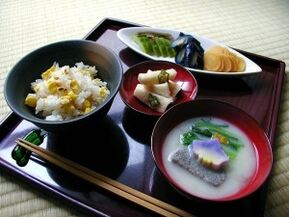The Japanese diet was created in a diet clinic in this country.
The authors of the system claim that it completely reconfigures the body's metabolism, after which the extra pounds lost will not be regained for at least a few years.
Basic principles of Japanese diet

A prerequisite for using the Japanese diet is the complete rejection of all types of alcohol, the prohibition of salt and sugar, pasta and sweets.
A specific diet plan designed for two weeks must be strictly followed: the suggested menu must be followed steadily all these days.
The diet's authors believe that deviations in the diet can shift metabolism in unwanted directions. One of the dietary conditions of the Japanese is to drink one and a half liters of boiled water every day.
Here is an example of the first day based on the suggested Japanese diet menu:
- breakfast - coffee;
- Lunch - a few eggs with a tomato or 200 g tomato juice, fresh cabbage salad;
- Dinner - fish, 200g and cabbage salad.
Even from this example it can be seen that the diet is not at all the usual Japanese food. In Japan, carbohydrates are preferred, mainly cereals, and they also eat a lot of seafood, vegetables and fruits. According to many doctors, it is this way of eating that makes Japanese people live longer.
In the Japanese diet, the 14-day menu focuses very little on carbohydrates, which are the main source of energy, meaning that the body will start consuming those available protein stores in muscle tissue as it looks for new ways to get food.
As a result, it is not fat tissue that is lost, but muscle tissue. This does not change even with increased protein intake, which also overloads the kidneys.
Menu all 14 days
First:
- Breakfast - coffee, one cup.
- Lunch - two eggs, cabbage salad with butter, tomato sauce.
- Dinner - olive oil fish.
second:
- Breakfast - coffee and brown bread.
- Lunch - fish 200 grams.
- Dinner - 100 grams of boiled beef and a cup of yogurt.
third:
- Breakfast - coffee with cookies.
- Lunch - Zucchini, fried.
- Dinner - two boiled eggs, cabbage salad, 150g boiled beef.
fourth:
- Breakfast is coffee.
- Lunch - 1 hard-boiled egg, 3-4 slices of hard-boiled carrots, olive oil, a piece of hard cheese.
- Dinner - Moderate amount of fruit, except bananas and grapes.

fifth:
- Breakfast - grated carrots, lemon juice.
- Lunch - 200 grams of fish, tomato juice.
- Dinner - fruit, except bananas and grapes.
sixth:
- Breakfast is coffee.
- Lunch - 200g cooked chicken and cabbage salad.
- Dinner - a few hard boiled eggs, raw carrot salad with butter.
seventh:
- Breakfast - green tea.
- Lunch - 200 grams of beef, some fruit, except bananas and grapes.
- Dinner - Any dinner selection during the week, except the third day.
eighth:
- Breakfast is coffee.
- Lunch - boiled chicken - 250 g, cabbage salad in oil.
- Dinner - two hard boiled eggs, carrot salad (200 g), olive oil.

ninth:
- Breakfast - raw grated carrots, lemon juice.
- Lunch - fish, tomato juice.
- Dinner - different fruits (except banana grapes).
tenth:
- Breakfast is coffee.
- Lunch - boiled eggs and 3-4 boiled carrots, olive oil, hard cheese slices.
- Dinner - all kinds of fruit, except bananas and grapes.
eleventh:
- Breakfast - coffee with cookies.
- Lunch - Zucchini slices, deep fried.
- Dinner - two eggs, butter cabbage salad, boiled beef 200g.
twelfth:
- Breakfast - coffee and cookies.
- Lunch - 200g fish, green salad, cabbage and butter.
- Dinner - drink 100 grams of beef and a cup of kefir.
thirteenth:
- Breakfast is coffee.
- Lunch - two eggs, cabbage salad, tomato sauce.
- Dinner - 200 grams of fish,
14. Last day:
- Same menu as day 13.
Nutritionist's Comments
In the recommended diet, there is a clear lack of the main micronutrients - calcium, magnesium, potassium - that the body needs to function adequately.
There is also a lack of iron, without which the blood-forming organs cannot work. Vitamins A, B, and C are also deficient. If the body is deficient, the person's appearance will deteriorate, the efficiency will drop, and the work of the endocrine glands and digestive organs will be disturbed.
The low calorie and monotony of the Japanese 14-day diet can lead to relapse and overeating. Sleep disturbances and decreased performance may be observed after the first week of using this diet.
Black coffee in the Japanese diet is a controversial product. Japanese food doesn't use coffee at all. People with cardiovascular disease should be wary of drinking coffee.






























